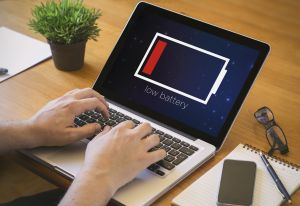When it comes to buying a new laptop one of the important features many of us consider is how long we’ll be able to use our new device on a single charge. It turns out that battery-life of most popular models falls far short of what their manufacturers claim.
Consumer reporting group Which? tested 67 laptop models to see how well their batteries help up to the stated estimates. Most fell drastically short – and not by minutes, but hours. In some cases, the laptops only kept working in real-world usage for 50 per cent of the time that the manufacturer had claimed.
HP and Dell laptops had the largest gaps between battery life expectations and actual endurance. But most models tested fell well-below manufacturers claims. The one stand-out model that the testers found was the MacBook which actually lasted longer on a single batter charge than Apple had advertised.
 Laptop battery life claims vs. reality
Laptop battery life claims vs. reality
-
HP – Claimed: 9 hours and 48 minutes
Reality (average of tested): 5 hours and 2 minutes
Dell – Claimed: 9 hours and 15 minutes
Reality: 5 hours and 12 minutes
Toshiba – Claimed: 7 hours and 58 minutes
Reality: 4 hours and 45 minutes
Asus – Claimed: 10 hours and 12 minutes
Reality: 6 hours and 53 minutes
Lenovo – Claimed: 6 hours and 41 minutes
Reality: 4 hours and 34 minutes
Acer – Claimed: 7 hours and 53 minutes
Reality: 5 hours and 59 minutes
Apple – Claimed: 10 hours
Reality: 10 hours and 15 minutes
Which? reached out to laptop manufacturers to ask about the discrepancies between their claims and real-world usage. Dell’s response was: “It’s difficult to give a specific battery life expectation that will directly correlate to all customer usage behaviours because every individual uses their PC differently – it’s similar to how different people driving the same car will get different gas mileage depending on how they drive.”
HP replied that their battery test “uses real life scripts and runs on real applications like Microsoft office.”, and that the exact specifications, such as screen resolution, will impact the results for each model.
Read more details in the full report from Which?
So, while long battery life is a key consideration for many consumers – we can’t always access the plug at Starbucks where we’re writing our masterpiece – take the manufacturers’ claims with a grain of salt.
On an anecdotal note: I am writing this on a Dell 11 3000 model that I have carried everywhere with me for about a year now. The battery generally lasts me nearly 8 hours, if I am writing and researching on the web. A little less if I am streaming music or videos.
As the spokesguy from HP mentioned, there are settings you can adjust to increase how long your battery will last.
Three quick ways to improve your battery life
Adjust your screen resolution. Dimming the brightness of your screen greatly reduce the drain on your battery and give you much more time between charges.
Change your power settings. Most laptops have a variety of power options that can affect speed, performance, and notifications. If you’re shooting for longer battery life on the go, reduce the power settings, or switch to Power Saver mode (in Windows). For optimal performance and display, you can always switch back when you’re near a plug.
Turn off your radios. If you are not using a Bluetooth device, then turn off your Bluetooth radio. Otherwise it will be constantly searching for devices to connect to in the background, using unnecessary power. Similarly, if you are not connected to a Wi-Fi network, then turn off your antenna.


